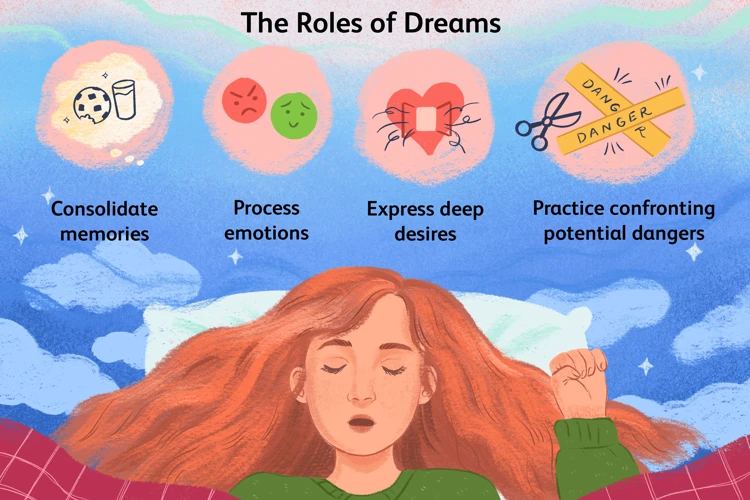Have you ever had a dream where you found yourself in a peculiar outfit, wondering what it could mean? Dreams have long fascinated humanity, with many cultures and religions placing significant importance on the symbols and messages they contain. In the Bible, dreams held a special place, often serving as a means of divine communication and guidance. The symbolism of clothes in dreams is particularly intriguing, as clothing can represent identity, status, and spiritual covering. In this article, we will delve into the biblical meaning of clothes in dreams, decoding the messages hidden within your nighttime wardrobe. So, fasten your seatbelt, as we embark on a journey through the fascinating world of dream interpretation.
Symbolism in Dreams

Dreams have always been a subject of fascination and wonderment for human beings. Throughout history, dreams have been interpreted in various ways, with many cultures and religions attributing deep symbolism to the images and events that occur during sleep. In the Bible, dreams hold particular significance, often serving as a channel for divine communication and guidance. Understanding the symbolic nature of dreams is crucial in unraveling their hidden messages and meanings. Within the realm of dream interpretation, clothing plays an important role, as it can symbolize aspects of identity, covering, and spiritual significance. By exploring the symbolism of clothes in dreams, we can gain insights into our subconscious thoughts and desires, as well as receive guidance from a higher spiritual realm. So, let’s delve into the world of dreams and decipher the profound symbolism behind our nighttime visions.
1. Importance of Dreams in the Bible
In the Bible, dreams hold a significant place in divine communication and prophecy. Throughout both the Old and New Testaments, dreams are portrayed as a means through which God communicates His will and imparts important messages to His people. From Joseph interpreting Pharaoh’s dreams in Genesis to Joseph, the earthly father of Jesus, receiving guidance through dreams in the New Testament, dreams are often a conduit for divine revelation. Here are a few examples of the importance of dreams in the Bible:
– Jacob’s dream of a ladder reaching up to heaven (Genesis 28:10-22)
– Joseph’s dreams of his future ruling over his brothers (Genesis 37:5-11)
– Pharaoh’s dream of seven fat cows and seven thin cows (Genesis 41:1-7)
– The magi being warned in a dream not to return to Herod (Matthew 2:12)
These instances highlight the idea that dreams can hold deep spiritual significance and can serve as a means of receiving guidance and revelation from God.
2. Symbolic Nature of Dreams
The symbolic nature of dreams is a fascinating aspect of human psychology and spirituality. Dreams often utilize symbols and metaphors to communicate deeper meanings and emotions. The symbolic language of dreams allows our subconscious mind to express thoughts and feelings in a way that may be difficult to convey in our waking lives. Certain symbols, such as animals, objects, or even clothing, can represent specific ideas or themes. For example, a lion may symbolize strength and courage, while a wedding ring may represent commitment and unity. Understanding the symbolic nature of dreams requires a keen awareness of personal and cultural associations, as well as an openness to exploring the hidden messages within our dreams. Here are a few key points to consider when examining the symbolic nature of dreams:
– Symbols are Personal: Each person brings their own unique experiences, beliefs, and emotions to their dreams. Symbols in dreams can have deeply personal meanings that may differ from person to person.
– Context is Crucial: The context in which a symbol appears in a dream is important for interpretation. Pay attention to the events and emotions surrounding the symbol to gain a better understanding of its significance.
– Symbolic Juxtaposition: Dreams often feature combinations of symbols that may seem unrelated or contradictory. These juxtapositions can offer valuable insights into the complexities of our subconscious mind.
– Archetypal Symbols: Some symbols hold universal meaning across cultures and time periods. These archetypal symbols often tap into deep aspects of the collective unconscious and can carry profound messages.
By recognizing and interpreting the symbolic nature of dreams, we can gain a deeper understanding of ourselves, our relationships, and the world around us. Dream interpretation is both an art and a skill, requiring intuition, self-reflection, and an open mind. So, let us embrace the mysterious and symbolic world of dreams as we seek to decode the powerful messages they hold.
Biblical Interpretation of Clothes

When it comes to the biblical interpretation of clothes in dreams, there are several key aspects to consider. Firstly, clothing is often associated with covering and identity. In the Bible, garments were used as a way to demonstrate one’s status, authority, or belonging to a particular group. Dreams involving clothes can therefore symbolize aspects of our identity, whether it be how we present ourselves to the world or our spiritual covering. Clean and dirty clothes also hold significance, representing purity and righteousness versus shame and impurity. Colors in dreams can carry symbolic meaning as well, with each color representing different emotions, attributes, or spiritual states. Ripped or torn clothes in dreams can indicate brokenness, vulnerability, or a need for healing. Lastly, dreams may present us with clothes from different cultures or time periods, highlighting the importance of understanding the historical and cultural context in order to interpret their meaning accurately.
1. Connection to Covering and Identity
When it comes to dreams, the symbolism of clothes goes beyond mere fashion. In the Bible, clothing often represents covering and identity. Just as Adam and Eve used fig leaves to cover their nakedness after realizing their vulnerability, clothing in dreams can signify a desire for protection, concealment, or even a sense of shame. Additionally, the clothes we wear in dreams can reflect our sense of self and how we project ourselves to others. Whether we are dressed in regal attire, indicating a sense of authority and confidence, or wearing tattered garments, symbolizing vulnerability and insecurity, the clothes in our dreams provide insights into our innermost thoughts and emotions surrounding our identity. By paying attention to the type of clothing we wear and how it makes us feel, we can gain a deeper understanding of our subconscious beliefs and desires.
2. Significance of Clean and Dirty Clothes
The cleanliness of clothes in dreams carries significant symbolism. Clean clothes generally symbolize purity, righteousness, and a positive spiritual state. They may represent a person’s integrity, moral standing, or their adherence to spiritual principles. When one dreams of wearing clean clothes, it can indicate a sense of spiritual renewal, a fresh start, or the attainment of inner peace. On the other hand, dirty or soiled clothes often symbolize sin, guilt, or negative emotions. They may represent past mistakes, unresolved issues, or a need for repentance. Dreaming of dirty clothes can serve as a reminder to examine one’s actions, seek forgiveness, and strive for a renewed sense of purity. Whether clean or dirty, the condition of clothes in dreams provides valuable insight into the dreamer’s spiritual and emotional state.
3. Color Symbolism in Dreams
When it comes to dreams, the colors we encounter can hold deep symbolic meaning. In the context of clothing, the colors we see can provide insight into the emotions, characteristics, and messages associated with our dreams. In biblical interpretation, colors often carry spiritual significance. For example, white clothing may symbolize purity, righteousness, or victory, while black clothing can represent sin, mourning, or spiritual darkness. The color red may signify passion, power, or the shedding of blood, while blue can symbolize peace, tranquility, or heavenly realms. Green is often associated with growth, rejuvenation, or the abundance of God’s blessings. By paying attention to the colors of the clothes in our dreams, we can gain a deeper understanding of the spiritual messages being conveyed and the emotions we may need to explore or address in our waking lives.
4. Ripped or Torn Clothes
Ripped or torn clothes in dreams carry their own unique symbolism. When your dream features torn clothing, it often signifies vulnerability, brokenness, or a feeling of being exposed. This can represent emotional or spiritual turmoil in your waking life. The torn clothes may indicate a need for healing or restoration in a particular area of your life. It could be a sign that you are carrying burdens or emotional wounds that need attention. The specific location of the tear or the condition of the clothing can provide further insight into the meaning of the dream. For instance, if the torn clothes are in a prominent area like the chest or back, it may suggest an openness or vulnerability in your relationships or personal life. Paying attention to these details can help you understand the message behind the dream and guide you towards the necessary steps for healing and growth.
5. Clothes of Different Cultures and Times
When it comes to dream interpretation, the clothes we wear in our dreams can vary greatly depending on the culture and time period they represent. In dreams, we may find ourselves dressed in traditional attire from ancient civilizations or modern outfits from different cultures around the world. These diverse garments hold their own symbolic meaning, reflecting the values, beliefs, and social norms of the specific culture or time period they belong to. For example, wearing a kimono in a dream may signify a connection to Japanese traditions and cultural heritage, while donning a medieval suit of armor could represent the need for protection and strength in the face of adversity. Exploring the clothes of different cultures and times in our dreams allows us to tap into the rich tapestry of human history and understand how our subconscious mind draws from these influences to convey deeper messages. Dressing up in these dream scenarios can hint at the need for multicultural awareness, a desire for personal growth, or even an invitation to explore other perspectives and ways of life.
Common Dream Scenarios and Interpretations

Common Dream Scenarios and Interpretations:
1. Wearing New Clothes: If you dream of wearing new clothes, it may symbolize a fresh start or a new chapter in your life. It could suggest personal growth, positive changes, or a newfound confidence. This dream may indicate that you are embracing new opportunities and are ready to embark on a different path.
2. Losing or Misplacing Clothes: Dreaming of losing or misplacing clothes can reflect feelings of vulnerability or a fear of losing your identity. It may suggest a lack of control over certain aspects of your life or a sense of insecurity. This dream might be a reminder to pay attention to your priorities and hold onto what truly matters.
3. Trying on Different Outfits: Trying on different outfits in a dream may symbolize exploration, self-discovery, and the need to adapt to different situations or personas. It could indicate a desire to express different sides of your personality or a willingness to experiment with new roles or experiences.
Understanding the symbolic interpretations of these common dream scenarios can provide valuable insights into your emotions, experiences, and subconscious desires. As you decipher the meanings behind these dream scenarios, you can uncover hidden messages that may guide you towards personal growth and spiritual development.
1. Wearing New Clothes
One common dream scenario is wearing new clothes. This can symbolize a fresh start, personal growth, or a positive transformation in one’s life. In biblical interpretation, new clothes signify a change in status or a shift in identity. It can represent a spiritual renewal or a deeper connection with God. This dream may indicate that you are embracing a new chapter in your life, leaving behind old ways and stepping into a brighter future. It may also suggest that you are gaining confidence and a sense of empowerment in your journey. By wearing new clothes in your dream, your subconscious mind may be encouraging you to embrace change and seize new opportunities that come your way.
2. Losing or Misplacing Clothes
Losing or misplacing clothes in a dream can carry significant symbolism and offer valuable insights into our waking lives. This dream scenario often represents a sense of vulnerability, insecurity, or a fear of losing one’s identity or social status. It may suggest that you are feeling lost or disconnected from your true self, struggling to find a sense of belonging or purpose. It could also indicate a fear of being exposed or judged by others. In some cases, losing or misplacing clothes in a dream might reflect a fear of losing control over a situation or feeling overwhelmed by life’s challenges. Consider these dreams as a gentle reminder to take a step back, evaluate your priorities, and regain a sense of stability and self-assurance. Embrace the opportunity to reconnect with your true essence and reaffirm your identity, even in the face of uncertainty and change.
3. Trying on Different Outfits
In dreams, the act of trying on different outfits carries its own unique symbolism. When you find yourself experimenting with various garments and styles in your dream, it often signifies a period of self-exploration and personal transformation. This dream scenario suggests that you are in the process of discovering and embracing different aspects of your personality or trying to find your true identity. Trying on different outfits in a dream can also symbolize the need for adaptability and flexibility in various situations or roles in your waking life. It may indicate that you are open to new experiences and willing to explore different paths. Pay attention to the emotions and feelings associated with trying on different outfits in your dream, as they can provide additional insights into your state of mind and aspirations.
Seeking Spiritual Guidance through Dreams
When it comes to seeking spiritual guidance, dreams can serve as a powerful tool. The messages and symbolism contained within our dreams have the potential to offer valuable insights into our spiritual journey and provide guidance for our waking lives. Here are two essential approaches to seeking spiritual guidance through dreams:
- Discerning the Message: Interpreting dreams requires discernment and attentiveness to the symbolism presented. Analyzing the various elements, such as the clothes worn in the dream, can help unravel the deeper meaning behind the message. Consider the emotions, actions, and context of the dream to gain clarity on the spiritual guidance being conveyed.
- Praying for Revelation: Seeking divine intervention through prayer can bring clarity and deeper understanding to the messages received in dreams. By fervently praying for revelation and guidance, one can open the channels for clear interpretation and guidance from a higher power.
By combining these two approaches, one can actively engage in the process of seeking spiritual guidance through dreams, allowing for a deeper connection with the divine and a clearer understanding of the messages being conveyed. Embracing the transformative power of dreams can lead to spiritual growth and a more profound connection to one’s inner self.
1. Discerning the Message
Discerning the message behind a dream can be a challenging task, but with the right approach, it is certainly possible. When trying to interpret the meaning of clothes in your dream, consider the following steps:
1. Reflect on the emotions: Take note of how you felt in the dream. Emotions can provide valuable clues about the message being conveyed. For example, if you felt joy and confidence while wearing certain clothes, it could indicate a sense of empowerment or self-assurance in your waking life.
2. Analyze the context: Pay attention to the overall context of the dream. Are you in a familiar or unfamiliar place? Are there other people present? Understanding the setting can help uncover the specific circumstances or areas of your life that the dream may be addressing.
3. Consider personal associations: Think about what clothes mean to you personally. Certain styles, colors, or types of clothing may hold specific significance based on your cultural background, personal experiences, or beliefs. These associations can provide valuable insights into the symbolism of the dream.
4. Seek patterns and connections: Look for recurring themes or symbols in your dreams. Is there a pattern of certain types of clothes appearing in different dream scenarios? Are there any connections between the clothes and other elements of the dream? Identifying patterns can help you piece together a more comprehensive interpretation.
Remember, dream interpretation is subjective, and it’s important to trust your intuition and personal connection to the symbols. Keeping a dream journal and practicing mindfulness can also enhance your ability to discern the messages hidden within your dreams.
2. Praying for Revelation
Praying for revelation is an essential aspect of seeking spiritual guidance through dreams. As believers, we can turn to prayer as a means of connecting with a higher power and inviting divine insight into our dreams. When faced with a dream that is mysterious or unclear, we can pray for clarity and understanding. By offering our dreams in prayer, we open ourselves to receiving deeper revelations and interpretations. Through prayer, we can also seek guidance and discernment in understanding the significance of the symbols and messages presented in our dreams. By humbling ourselves before the divine and inviting spiritual revelation, we create an atmosphere of receptiveness to the wisdom and guidance that dreams can bring. So, let us not underestimate the power of prayer in unlocking the deeper meanings of our dreams and connecting with the divine source of all knowledge and understanding.
Conclusion
In conclusion, the biblical interpretation of clothes in dreams reveals the deep symbolism and spiritual significance attached to our nighttime wardrobe. The Bible teaches us that dreams can be a means through which divine messages are conveyed, offering guidance and insight into our lives. When it comes to clothing in dreams, the symbolism can vary based on factors such as cleanliness, color, condition, and cultural context. Clean and white clothes often represent purity and righteousness, while dirty or torn clothes can symbolize guilt or shame. Different cultural outfits in dreams may point to our connection with specific cultures or historical contexts. Ultimately, understanding the biblical meaning of clothes in dreams allows us to gain a deeper understanding of our identity, spiritual covering, and the messages that the divine may be communicating to us through the medium of our dreams.
Frequently Asked Questions
1. What is the biblical significance of dreams?
In the Bible, dreams are considered a means of divine communication. They have been used to convey messages, provide guidance, and reveal future events.
2. How can dreams be interpreted symbolically?
Symbols in dreams often represent deeper meanings beyond their literal interpretation. Objects, events, and even clothing in dreams can hold symbolic significance related to personal experiences or spiritual messages.
3. What does clothing symbolize in dreams?
Clothing in dreams can symbolize identity, covering, and spiritual significance. It may reflect how we perceive ourselves, our status, or provide insights into our spiritual journey.
4. What does it mean to dream of clean clothes?
Clean clothes in dreams often represent purity, righteousness, or a fresh start. It may indicate a desire for spiritual renewal or a sense of moral integrity.
5. What about dreams of dirty or stained clothes?
Dirty or stained clothes in dreams may signify guilt, shame, or impurity. It could suggest unresolved issues or a need for forgiveness and cleansing.
6. What is the significance of colors in dream clothing?
Colors in dream clothing can hold symbolic meaning. For example, white can represent purity or spirituality, red may signify passion or danger, while black might symbolize mystery or sorrow.
7. What does it mean to dream of ripped or torn clothes?
Torn or ripped clothes in dreams can indicate vulnerability, brokenness, or a sense of loss. It may suggest a need for healing or restoration in a particular area of life.
8. Can clothing from different cultures or time periods in dreams hold symbolism?
Yes, clothing from various cultures or time periods in dreams can carry symbolic significance. It may relate to your connection with ancestral roots, exploration of different aspects of self, or a reflection of diverse influences in your life.
9. What does it mean to dream of wearing new clothes?
Wearing new clothes in dreams can symbolize personal growth, a fresh start, or a positive change in circumstances. It may indicate a sense of empowerment or a new chapter in your life.
10. What does it mean to dream of losing or misplacing clothes?
Dreaming about losing or misplacing clothes may suggest a fear of losing identity, uncertainty in life, or a desire for stability. It could be a reminder to reassess your priorities and regain a sense of control.


